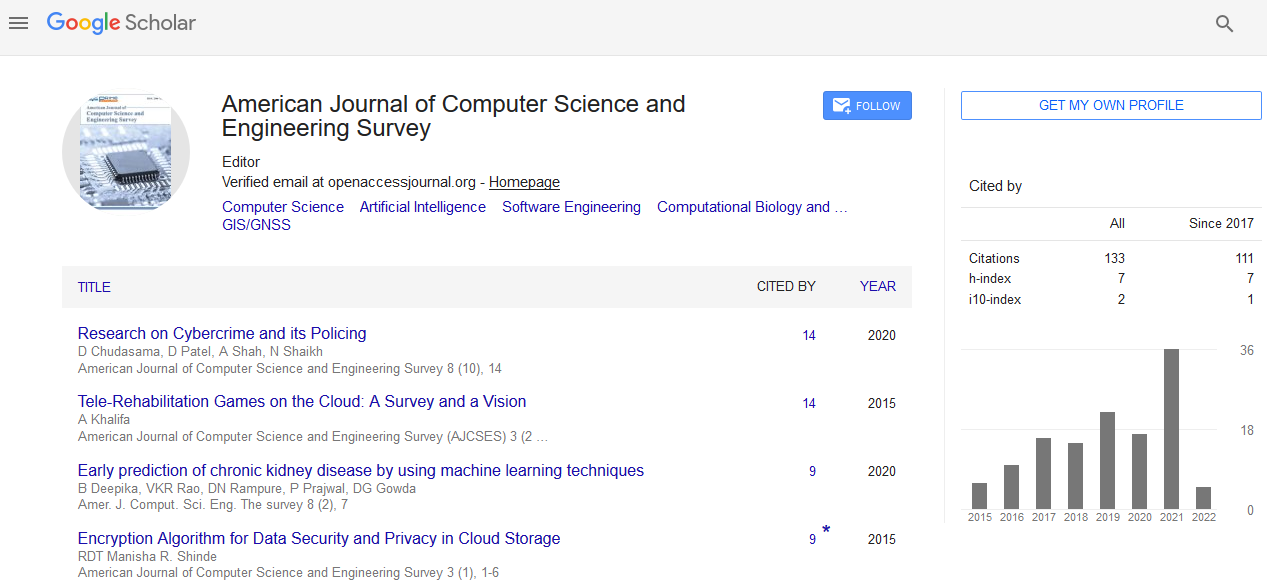Commentary - (2024) Volume 12, Issue 2
Machine Learning: Unleashing the Power of Data
Fang Zhang*
Department of Robotic Technology, Wuhan University, China
*Correspondence:
Fang Zhang,
Department of Robotic Technology, Wuhan University,
China,
Email:
Received: 29-May-2024, Manuscript No. IPACSES-24-20624;
Editor assigned: 31-May-2024, Pre QC No. IPACSES-24-20624 (PQ);
Reviewed: 14-Jun-2024, QC No. IPACSES-24-20624;
Revised: 19-Jun-2024, Manuscript No. IPACSES-24-20624 (R);
Published:
26-Jun-2024, DOI: 10.36846/2349-7238.24.12.16
Description
Machine Learning (ML) stands as a cornerstone of modern
artificial intelligence, revolutionizing industries, research, and
everyday life through its ability to analyze data, recognize
patterns, and make predictions without explicit programming.
This perspective delves into the fundamental principles of
machine learning, its applications across diverse sectors,
and its transformative impact on society. At its essence,
machine learning involves training algorithms to recognize
patterns and make decisions based on data. Unlike traditional
programming, where rules are explicitly defined by developers,
machine learning algorithms learn from vast datasets. They
iteratively improve their performance over time, adapting to
new information and refining their predictions. This iterative
process is facilitated through various techniques, including
supervised learning (where algorithms are trained on labeled
data), unsupervised learning (where algorithms discover
patterns in unlabeled data), and reinforcement learning (where
algorithms learn through trial and error). Machine learning
has permeated virtually every sector, catalyzing innovation
and efficiency. From diagnosing diseases and predicting
patient outcomes to personalized treatment plans and drug
discovery, machine learning enhances healthcare delivery and
research. Machine learning algorithms analyze financial data to
detect fraud, predict market trends, and optimize investment
strategies, enhancing decision-making and risk management.
Personalized recommendations, demand forecasting, and
inventory management are powered by machine learning
algorithms, improving customer satisfaction and operational
efficiency. Autonomous vehicles rely on machine learning for
navigation, obstacle detection, and decision-making in realtime
environments, paving the way for safer and more efficient
transportation systems. Key advancements in machine learning
contribute to its rapid evolution: A subset of machine learning
inspired by the structure and function of the human brain, deep
learning utilizes neural networks with multiple layers to process
complex data, enabling breakthroughs in image recognition,
natural language processing, and speech recognition. NLP
techniques enable machines to understand, interpret, and
generate human language, facilitating applications such as
chatbots, language translation, and sentiment analysis. Machine
learning algorithms in computer vision analyze visual data from
images and videos, enabling applications like facial recognition,
object detection, and medical imaging analysis. Despite its
transformative potential, machine learning faces challenges
such as bias in data, interpretability of complex models, and
ethical implications surrounding algorithmic decision-making.
Ensuring fairness, transparency, and accountability in machine
learning systems is essential to mitigate these challenges and
build trust among users and stakeholders. Looking ahead, the
future of machine learning holds promise with advancements
in Explainable AI (XAI), federated learning for decentralized data
processing, and the integration of AI with Internet of Things
(IoT) devices. These innovations will drive further adoption
across industries, empower decision-makers with actionable
insights, and enhance human-machine collaboration. Despite
its transformative potential, machine learning faces challenges
such as bias in data, interpretability of complex models, and
ethical implications surrounding algorithmic decision-making.
Ensuring fairness, transparency, and accountability in machine
learning systems is essential to mitigate these challenges
and build trust among users and stakeholders. Machine
learning represents a paradigm shift in how we analyze data,
solve complex problems, and interact with technology. By
leveraging its capabilities responsibly and ethically, we can
harness machine learning to address societal challenges, drive
innovation, and create a more interconnected and intelligent
world.
Acknowledgement
None.
Conflict Of Interest
None.
Citation: Zhang F (2024) Machine Learning: Unleashing the Power of Data. Am J Comp Science. 12:16.
Copyright: © 2024 Zhang F. This is an open-access article distributed under the terms of the Creative Commons Attribution License, which permits unrestricted use, distribution and reproduction in any medium, provided the original author and source are credited.

